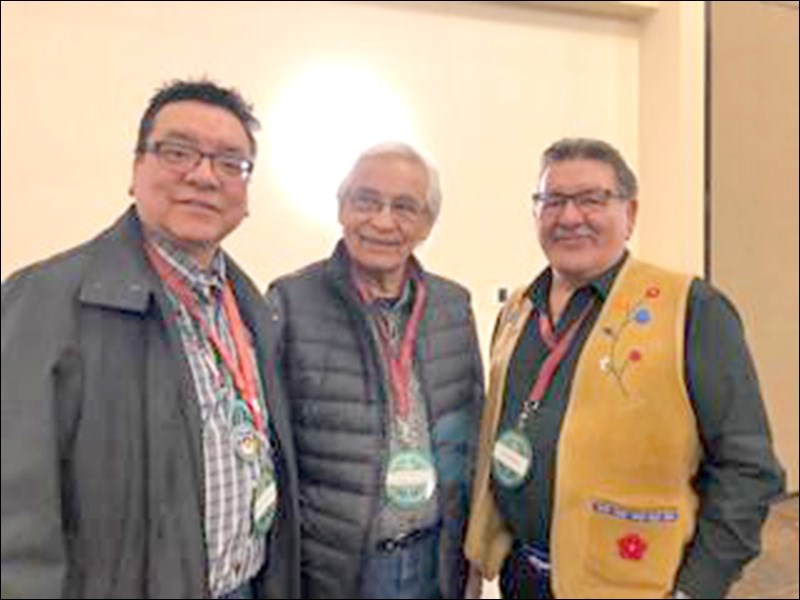From March 5-7, I was part of a group from Poundmaker Cree Nation that attended the Strengthening and Revitalizing-Indigenous Language and Culture conference in Membertou, at the northern end of Cape Breton Island, Nova Scotia.
Membertou is a Mi’kmaq community on the edge of the city of Sydney, which was once the staging point for the merchant marines conveying supplies to the Allies during World War 11. A former industrial city known for its steel plants, it has now re-emerged as a tourist destination where cruise ships stop by on their Atlantic routes and the city has preserved its unique Cape Breton characteristics; quaint wooden houses and a well-developed harbour for evening strolls and sight seeing. A cab driver said that formerly Membertou was no different from any part of Sydney, a little run down maybe but now over the years through the visionary leadership of its past chiefs, Membertou has been reborn as a unique Indigenous community bringing economic opportunities not only to its own people, but to all peoples of Sydney and beyond through its development projects. One of these projects is the Membertou Trade and Convention Centre where the conference took place.
There were delegates from across Canada representing many Indigenous Nations and all there with the goals of networking and sharing ideas for revitalizing our Indigenous languages. Some communities, like the Lenne Lape Nation of Ontario, have only two language speakers left and many, including Poundmaker, have most people only over the age of 40 (with a few notable exceptions) able to communicate fluently in their language.
The reality is that our languages are in a precarious state and we must do all that we can to preserve and promote our languages. Evidence shows that speaking your Indigenous language is in no way an impediment to higher educational learning as many in our current generation who have succeeded in the broader society demonstrate. Who would’ve thought that speaking your own language would today be considered an admirable asset when in our childhoods speaking our language was often times discouraged.
One of the touching and most profound moments was when the youths took the stage to share their hopes and dreams of language revitalization. One young man whose first language was Mi’kmaq taught to him by his parents and grandparents, his voice cracking, shared his hope to carry his language one generation further by teaching his own children. This area of Canada was initially colonized by John Cabot in the 15th century and thereafter villages of Portugese settlers lived in the bays of the rocky shores, sealing and fishing for their livelihoods. Despite 500 years of colonial threat the Mi’kmaq language has survived and is thriving mainly due to deliberate and conscientious efforts on the part of Mi’kmaq language speakers.
One of our purposes in attending this conference was to also meet with the language group of the La Ronge First Nation, headed by Chief Tammy Cook Searson. They, too, are searching for ways in which to promote their language and we, Poundmaker, are their partner in finding ways to meet, talk and strategize potential strategies for language development. We are two of the partnering groups in Canada that are part of the long range planning of Indigenous Leadership Development Institute, who organized this conference. Melanie Dean, director of executive training was the main contact and organizer for this very well-managed event. It was quite the task to bring 300 delegates from near and far to this remote area of Canada.
The delegates from Poundmaker, Austin Tootoosis, Milton Tootoosis, Beverly Moyah, Isobel Weenie, Clarence Semaganis and yours truly, were very inspired by this conference and many came back with future plans and ideas in promoting our language and furthering the discussion and also being part of the world wide movement in preserving our Indigenous languages. We finished the conference all thinking of our parents who had the bravery and foresight to teach our Cree language despite the outside colonial pressures.
We left hurriedly in a taxi as all local flights were cancelled due to a snowstorm. The taxi ride took five hours through some very beautiful landscapes, including the Cape Breton Highlands and many views of the bays strewn with ice floes upon which baby seals would be soon resting and sleeping while their parents dove in the waters for food. It was a remarkable journey and it was accented by the winter storm that grounded all flights and stranded many of the delegates, some of whom only made it home four days later.




